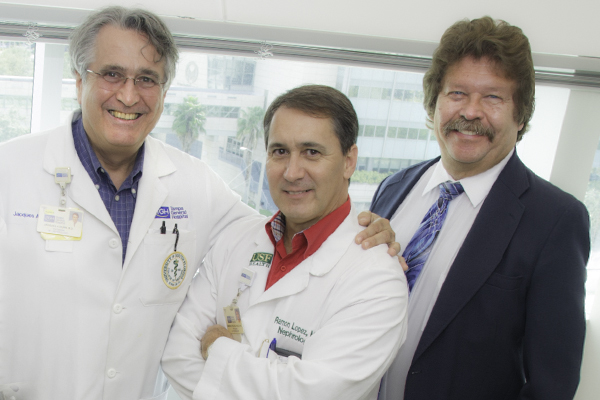A national clinical trial was halted when it became evident that more intensive management of high blood pressure for certain people improved survival and incidence of heart attacks, strokes and heart failure.
The Systolic Blood Pressure Intervention Trial, nicknamed SPRINT study, aimed to see if using multiple targeted medications to reduce the systolic blood pressure in certain patients to less than 120 mmHg would be beneficial.
By the fourth year of the 5-year study, it became clear that aiming for less than 120 mmHg was beneficial and the study was halted, said Ramon Lopez, MD, associate professor in the Division of Nephrology and Hypertension in the USF Health Morsani College of Medicine and SPRINT principal investigator at the USF Health clinical site.

Dr. Ramon Lopez (center) is principal investigator for the USF Health SPRINT study, with co-investigators Dr. Jacques Durr, director of the Division of Nephrology and Hypertension, and Dr. Juris Janavs, study coordinator.
USF Health was one of the sites participating in this large study that was sponsored by the National Institutes of Health (NIH). The USF Health team, which studied 54 of the 9,361 participants, earned honorary awards for their performance and compliance in the study.
The SPRINT Data and Safety Monitoring Board decided to stop the study at the end of August 2015, Dr. Lopez said.
“The results showed a clear benefit in survival and cardiovascular events for more aggressive management of hypertension,” Dr. Lopez said. “For this group of patients, reducing the systolic blood pressure to less than 120 mmHg reduced their likelihood of cardiovascular events by as much as a third and the risk of any cause death by nearly a quarter compared to the targeted systolic pressure of less than 140 mmHg.”
Although the study ended early, participants will continue to be monitored for the remaining year of the study to obtain further data on cognitive and kidney function, he said.
“For patients, the early information will not likely change how their own hypertension is being treated currently because the final data is being compiled for peer-reviewed publication, a critical step before any wide-spread guidelines can be adjusted.”
All SPRINT study participants were non diabetic and 50 years old or older, with the average being age 67. The 9,361 study participants were divided into two groups, a standard group that was given and average of two medications, which caused a reduction in systolic blood pressure to 134 mmHg, and an intensive group, which was given an average of three medications that resulted in a larger decrease in systolic blood pressure to 118 mmHg.

Study participant Charles Helsene (center) has a follow up visit at the USF Health Morsani Center with Dr. Janavs and Dr. Lopez.
Our blood pressure measurements are given as two numbers, such as 110 over 70 (written as 110/70). The top number is the systolic reading, representing the maximum pressure exerted when your heart contracts. And the bottom number is the diastolic reading, representing the minimum pressure in your arteries when your heart is at rest.
Published data is expected later this fall, Dr. Lopez said.
“While waiting for the study results to be published and guidelines to be revised, we can take steps with our lifestyles that may be beneficial in reducing high blood pressure, including loosing excess weight with diet and exercise and decreasing the amount of salt we consume. Your provider can provide blood pressure screening, diet and exercise advice and monitor changes in your blood pressure,” he said.
At USF Health, 54 patients participated in the national study through the Division of Nephrology and Hypertension in the USF Health Morsani College of Medicine. In addition to Dr. Lopez as Principal Investigator, USF Health faculty involved in the study include: Elias Doumit, MD, Assistant Professor; Jacques Durr, MD, Professor and Director of the Division of Nephrology and Hypertension; Juris Janavs, MD, study coordinator; Christopher McFarren, MD, Associate Professor, Stephen Rifkin, MD, Associate Professor, and Kevin Sneed PharmD, and Dean USF College of Pharmacy.
Story by Sarah Worth, photos by Eric Younghans, USF Health Office of Communications.
